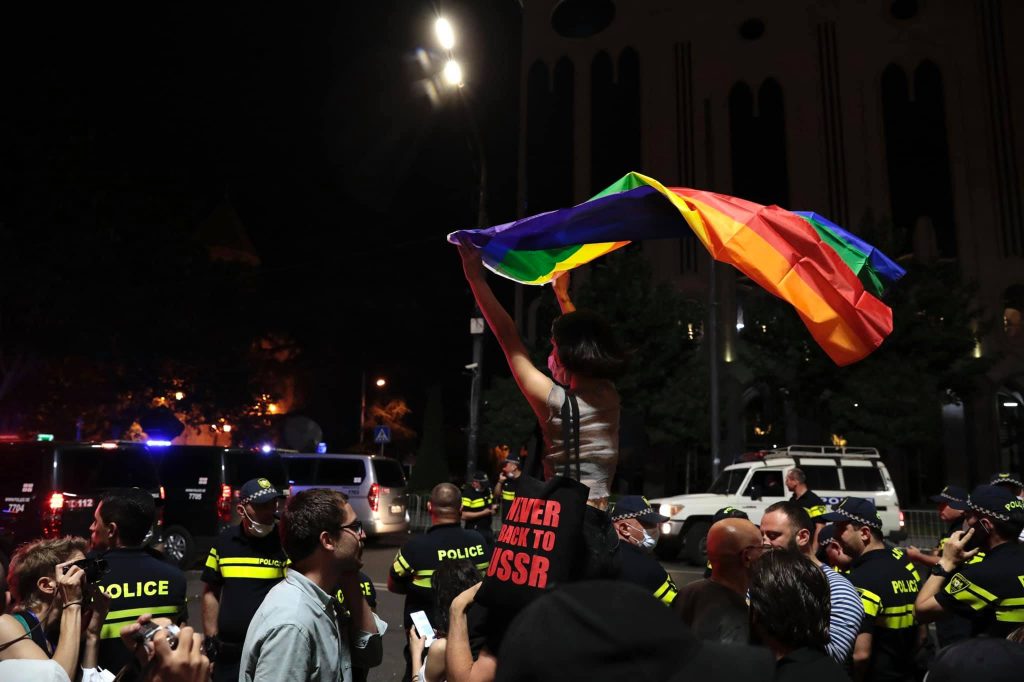Georgian Civil Society Organizations – Georgian Young Lawyers’ Association (GYLA), Social Justice Center (SJC) and Georgian Democracy Initiative (GDI) – have published their separate 2021 Human Rights reports, delving into a number of issues, including possible election violations, the July 5 homophobic pogroms, state response to the Covid-19 pandemic, judicial appointments and alleged overreach of the State Security Service.
October 2021 Municipal Elections
All three watchdogs raised concerns in their reports, released on December 10 over alleged violations that marred Georgia’s 2021 local polls – before, during and after the polling day.
GYLA noted that the “tense environment” on the election day affected voter behavior and, in some cases, hindered the free exercise of the right to vote. It also observed that physical and verbal confrontations during the election campaign further deepened political polarization in the country.
The SJC also observed that “antagonism and hostile rhetoric,” as well as election violations contributed to “political polarization and radicalization” during the election period.
It also argued that former President Mikheil Saakashvili’s return to Georgia on the eve of elections, as well as events related to his incarceration, further augmented the political divisions, “weakening the influence and electoral figures of small political parties.”
GDI on its part said “a number of serious violations” recorded during the pre-election period and at the polling stage “called into question the existence of a fair, free and equal electoral environment and enfeebled confidence in its final results.”
Homophobic Pogroms, Right to Free Assembly
All three CSOs expressed their concerns over the July 5 violence, when unchecked far-right mobs targeted queer activists organizing March of Dignity and journalists covering the day, leading to attacks on more than 50 people.
GYLA said the state did not prevent or react effectively to the violence and as a result, LGBT+ people were deprived of the possibility to exercise their right to free assembly, as Tbilisi pride had to cancel the March.
The SJC stressed that investigations into the events is fragmented, with the government lacking “political will” to hold the organizers of the violence responsible. The watchdog pointed at the far-right Alt-Info group, which runs a TV network and recently established a political party, as the organizer of the violent gathering.
In the context of the right to Free Assembly, the CSOs also criticized changes to Georgia’s Administrative Offences Code that tightened penalties for police disobedience and petty hooliganism. GDI argued that the rules are used as a “tool” by the government to silence and repress activists.
Covid-19 Pandemic and Social Issues
GYLA and SJC have also voiced concern that the pandemic and related restrictions exacerbated the dire social-economic situation in the country. GYLA noted the curbs on economic activities in 2021 led to the loss of income to many and put them at risk of failing to deliver on their financial obligations and debts.
The two CSOs, in their reports, also pointed to strikes and social protests that swept the country in 2021 with demands of decent pay and ensuring basic labor rights. The SJC, in particular, argued that it was “difficult” for the government to respond quickly and adequately to the demands of such protests.
Social Justice Center argued that the political crisis not only eclipsed the “concerning human and social consequences of the pandemic,” but also the country’s “dire social and economic situation,” exacerbated by the “unprecedented” level of inflation, as well as reforms for the protection human rights and equality.
Calling the pandemic management problematic, GDI also argued that the political crisis in the country overshadowed the pandemic, undermining the health and economic welfare of the population. It also noted that the government restrictions imposed to curb the pandemic were disproportionate and in contravention of the constitution
Judiciary and Alleged Politically-motivated Proceedings
GYLA and GDI also slammed the “politicized” justice system and the influence of the influential group of justices, the so-called “clan,” on the judiciary.
They criticized the process of judicial appointments, underway in 2021 despite calls from international partners to first reform the system. GYLA noted that the process exposed that the “clan” appoints loyal judges to “strategic, important positions, which further strengthens the informal hierarchy already entrenched in the judiciary.”
GDI also raised concerns over “politically motivated litigations,” referring to proceedings against United National Movement leader Nika Melia, UNM-era Defense Minister and TV Formula Founder David Kezerashvili and ex-President Mikheil Saakashvili.
State Security Service
Speaking about alleged state security files leaked in September, the SJC slammed the “excessive influence” of security services and the “large-scale unlawful wiretappings,” which create a “grave experience of social control and mistrust.”
Meanwhile, GDI in this context lambasted the lack of “proper response” by the authorities to violations of privacy and the right to communication. It also criticized the “lack of will” on the part of the government to change and improve relevant legislature, that according to the organizations, does not protect citizens’ relevant rights.
Also Read:
This post is also available in: ქართული (Georgian) Русский (Russian)

